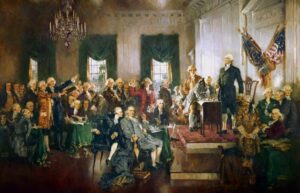This coming Tuesday, America observes its 241st birthday with cookouts, parades, and fireworks. Although we often take our freedoms for granted, Independence Day really should be celebrated with great fanfare and all citizens should pause to thank God and our founders for the rare privileges we enjoy.
Fifty-six men of courage and principle literally stuck their necks out by pledging their lives, their fortunes, and their sacred honors as they affixed their signatures to this treasonous document. These were not men looking for power with nothing to lose. They were loyal, wealthy, and influential and they wrestled long and hard with the decision to finally oppose British rule that had decayed into tyranny. 
Many of these men did end up losing their lives and fortunes for signing our nation’s birth certificate but cemented their sacred honors in the process. We easily forget that the Declaration triggered a bitter war in which the colonists paid a high price with their property, their tears, and their blood.
One of the signers, William Ellery, was a Harvard graduate and Rhode Island lawyer. Four months after affixing his name to this famous document, Ellery saw his home burned and all of his property lost to British troops. Eleven other founders had their homes ransacked and burned as well. Imagine watching your home go up in smoke and seeing your family become indigent, all because of a controversial stand you took.
Seventeen of the signers lost all they owned, including Carter Braxton of Virginia. He believed in the American cause so fervently that he invested his fortune in it, never to be repaid. His ships were seized and he eventually mortgaged and sold his properties to pay his debts and his descendants relate that he died with the sheriff at his home trying to collect for another creditor.
Thomas Nelson, Jr was another of Virginia’s seven signers and lived in a stately home in Yorktown which the British General Cornwallis appropriated for his headquarters. Realizing that his personal losses were minimal compared to his country’s potential gains, he urged General Washington to fire on his own home, which he did. The home suffered major damage and Nelson also died a debtor.
Francis Lewis of New York was another who paid dearly as did his family. Not only were his house and property destroyed, but the king’s troops imprisoned his wife for two months. As a result of that stress, Lewis buried his young wife two years later.
John Hart and his family were prosperous New Jersey farmers. In December of 1776, as the British approached, he was forced to leave the bedside of his dying wife. While the enemy pressed in, he hid in the mountains often sleeping in caves. When he eventually returned, he discovered that the British had raided his buildings, stolen his livestock, and that his wife had died. Just three years later, he also died without seeing any of his thirteen children again.
Another New Jersey signer, Richard Stockton, was yanked out of bed in the middle of the night, beaten and thrown in jail three months following his signature. After nearly succumbing to starvation, he recanted his decision, took an oath of allegiance to King George and was released. Upon returning to his home, he found that it had been pillaged and his possessions burned. Although he later swore allegiance to New Jersey, he was so weakened by his harsh treatment that he died before the war ended forcing his family to survive by the generosity of others.
Three South Carolina signers spent a year in the St. Augustine Prison. Even the first and most famous signer did not escape unscathed as John Hancock’s newborn daughter died from the trip his family was forced to make to avoid the advancing British.
Of the fifty-six signers, nine put their actions where their words were, joined the Continental Army and later died from either wounds or hardships. Five others were captured, charged with insurrection and tortured. Two saw their sons killed as they fought for the cause their fathers signed for, while another two had sons captured and held as prisoners, doubtless experiencing greater suffering because of their fathers’ actions.
As we observe this special day in our nation, let’s pause to reflect on the high price these men and their families paid to secure our liberties and may we be willing to take courageous stands when needed as well.
Thankful for freedom, George